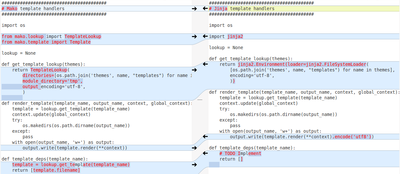I maintain a couple of small "planet" sites. If you are not familiar with planets,
they are sites that aggregate RSS/Atom feeds for a group of people related
somehow. It makes for a nice, single, thematic feed.
Recently, when changing them from one server to another, everything broke.
Old posts were new, feeds that had not been updated in 2 years were
always with all its posts on top... a disaster.
I could have gone to the old server, and started debugging why rawdog was
doing that, or switch to planet, or look for other software, or use an
online aggregator.
Instead, I started thinking... I had written a few RSS aggregators in the past...
Feedparser is again under active development... rawdog and planet seem to be
pretty much abandoned... how hard could it be to implement the minimal
planet software?
Well, not all that hard, that's how hard it was. Like it took me 4 hours, and was
not even difficult.
One reason why this was easier than what planet and rawdog achieved is that I am
not doing a static site generator, because I already have one
so all I need this program (I called it Smiljan) to do is:
Parse a list of feeds and store it in a database if needed.
Download those feeds (respecting etag and modified-since).
Parse those feeds looking for entries (feedparser does that).
Load those entries (or rather, a tiny subset of their data) in the database.
Use the entries to generate a set of files to feed Nikola
Use nikola to generate and deploy the site.
So, here is the final result: http://planeta.python.org.ar which still needs theming
and a lot of other stuff, but works.
I implemented Smiljan as 3 doit tasks, which makes it very easy to integrate with Nikola
(if you know Nikola: add "from smiljan import *" in your dodo.py and a feeds file with the
feed list in rawdog format) and voilá, running this updates the planet:
doit load_feeds update_feeds generate_posts render_site deploy
Here is the code for smiljan.py, currently at the "gross hack that kinda works" stage. Enjoy!
# -*- coding: utf-8 -*-
import codecs
import datetime
import glob
import os
import sys
from doit.tools import timeout
import feedparser
import peewee
class Feed(peewee.Model):
name = peewee.CharField()
url = peewee.CharField(max_length = 200)
last_status = peewee.CharField()
etag = peewee.CharField(max_length = 200)
last_modified = peewee.DateTimeField()
class Entry(peewee.Model):
date = peewee.DateTimeField()
feed = peewee.ForeignKeyField(Feed)
content = peewee.TextField(max_length = 20000)
link = peewee.CharField(max_length = 200)
title = peewee.CharField(max_length = 200)
guid = peewee.CharField(max_length = 200)
Feed.create_table(fail_silently=True)
Entry.create_table(fail_silently=True)
def task_load_feeds():
feeds = []
feed = name = None
for line in open('feeds'):
line = line.strip()
if line.startswith('feed'):
feed = line.split(' ')[2]
if line.startswith('define_name'):
name = ' '.join(line.split(' ')[1:])
if feed and name:
feeds.append([feed, name])
feed = name = None
def add_feed(name, url):
f = Feed.create(
name=name,
url=url,
etag='caca',
last_modified=datetime.datetime(1970,1,1),
)
f.save()
def update_feed_url(feed, url):
feed.url = url
feed.save()
for feed, name in feeds:
f = Feed.select().where(name=name)
if not list(f):
yield {
'name': name,
'actions': ((add_feed,(name, feed)),),
'file_dep': ['feeds'],
}
elif list(f)[0].url != feed:
yield {
'name': 'updating:'+name,
'actions': ((update_feed_url,(list(f)[0], feed)),),
}
def task_update_feeds():
def update_feed(feed):
modified = feed.last_modified.timetuple()
etag = feed.etag
parsed = feedparser.parse(feed.url,
etag=etag,
modified=modified
)
try:
feed.last_status = str(parsed.status)
except: # Probably a timeout
# TODO: log failure
return
if parsed.feed.get('title'):
print parsed.feed.title
else:
print feed.url
feed.etag = parsed.get('etag', 'caca')
modified = tuple(parsed.get('date_parsed', (1970,1,1)))[:6]
print "==========>", modified
modified = datetime.datetime(*modified)
feed.last_modified = modified
feed.save()
# No point in adding items from missinfg feeds
if parsed.status > 400:
# TODO log failure
return
for entry_data in parsed.entries:
print "========================================="
date = entry_data.get('updated_parsed', None)
if date is None:
date = entry_data.get('published_parsed', None)
if date is None:
print "Can't parse date from:"
print entry_data
return False
date = datetime.datetime(*(date[:6]))
title = "%s: %s" %(feed.name, entry_data.get('title', 'Sin título'))
content = entry_data.get('description',
entry_data.get('summary', 'Sin contenido'))
guid = entry_data.get('guid', entry_data.link)
link = entry_data.link
print repr([date, title])
entry = Entry.get_or_create(
date = date,
title = title,
content = content,
guid=guid,
feed=feed,
link=link,
)
entry.save()
for feed in Feed.select():
yield {
'name': feed.name.encode('utf8'),
'actions': [(update_feed,(feed,))],
'uptodate': [timeout(datetime.timedelta(minutes=20))],
}
def task_generate_posts():
def generate_post(entry):
meta_path = os.path.join('posts',str(entry.id)+'.meta')
post_path = os.path.join('posts',str(entry.id)+'.txt')
with codecs.open(meta_path, 'wb+', 'utf8') as fd:
fd.write(u'%s\n' % entry.title.replace('\n', ' '))
fd.write(u'%s\n' % entry.id)
fd.write(u'%s\n' % entry.date.strftime('%Y/%m/%d %H:%M'))
fd.write(u'\n')
fd.write(u'%s\n' % entry.link)
with codecs.open(post_path, 'wb+', 'utf8') as fd:
fd.write(u'.. raw:: html\n\n')
content = entry.content
if not content:
content = u'Sin contenido'
for line in content.splitlines():
fd.write(u' %s\n' % line)
for entry in Entry.select().order_by(('date', 'desc')):
yield {
'name': entry.id,
'actions': [(generate_post, (entry,))],
}


